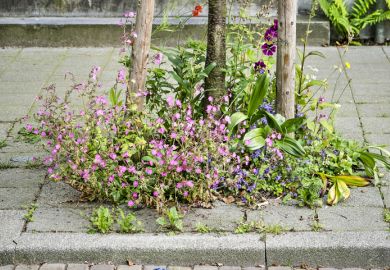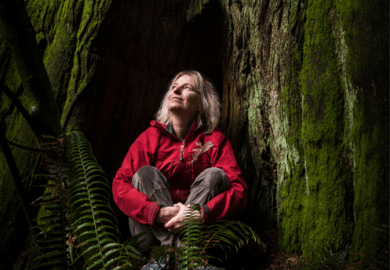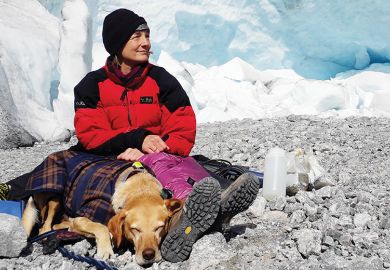This is a beautifully told story of an outrageous hypothesis, "snowball earth", that proposes that all complex plant and animal life evolved only after the whole earth had been subjected to a sequence of alternate freezing and baking episodes some 600 million years ago. These are grand themes, to which Gabrielle Walker presents an accessible, but not wholly impartial introduction.
She provides clear explanations of the geological concepts encountered and her prose is direct and expressive. The struggle to obtain the geological evidence and its use to alternatively bolster up, tear down or redefine the snowball earth hypothesis are sensitively and dramatically described. Walker has travelled extensively to see for herself the geological sites and to experience the rigours of fieldwork in harsh environments. She sees dedicated geologists alternately fighting clouds of ferocious flies in the Arctic and carrying out meticulous work in the parched deserts of Namibia and Australia. On a field trip in Newfoundland she describes "a troupe of soggy, sodden, steaming geologists squelching over the saturated mosses and the black muddy streams".
She demonstrates considerable tenacity as a scientific journalist in her meetings with the key protagonists who have argued over the hypothesis. Its roller-coaster development is revealed through a series of vignettes describing these characters and analysing their motivations. Readers will be fascinated by her compelling picture of geology as an intensely personal social activity.
As rock formations around the world have yielded their secrets, a strengthening case has been established for periods of global freezing lasting millions of years interspersed with hyper-greenhouse episodes where temperatures soared to 40C. It is comforting to read that the aggregation of the earth's land masses into an equatorial mega-continent is an essential precursor to such extreme conditions.
Although we are led with confidence along the tortuous path of conflicting ideas and interpretations as the geological story unfolds, Walker is less sure footed when it comes to dealing with the biological implications of snowball earth. Exactly how the proposed climatic maelstrom may have triggered the sudden evolution of complex life forms is only briefly examined. Alternative explanations are not considered. The geologists have only grudgingly yielded the necessary presence of areas of open water needed to secure the survival of photosynthesising micro-organisms during periods of global deep freeze. Astonishingly, the proponents of snowball earth suggest that the micro-organisms contained in a few thousand buckets full of sea water dotted about the oceans could suffice to seed the explosive evolution of the tumultuous diversity of complex animals and plants over the whole earth shortly after the final thaw.
The author refers to the global community of microbial life during the 3,000 million years before these events rather dismissively as "slimeball earth". However, she concedes that "Earth's most primitive experiment with life was also its best". The persistence of life over this vast time span indicates the tenacity of the microbes and the inherent stability of their intricate communities. Complex, multicellular organisms are not only latecomers in the earth's history but are probably very rare in the universe because of the extraordinary sequence of events that seems necessary for their evolution. Their tenure is correspondingly insecure.
This makes all the more pathetic our blind eagerness to trigger a mass extinction that seems destined to eradicate much of this hard-won diversity in a few generations.
Michael Whitfield is honorary visiting professor in marine science, Plymouth University.
Snowball Earth: The Story of the Great Global Catastrophe that Spawned Life as we Know it
Author - Gabrielle Walker
Publisher - Bloomsbury
Pages - 269
Price - £16.99 and £8.99
ISBN - 0 7475 6051 X and 6850 2
Register to continue
Why register?
- Registration is free and only takes a moment
- Once registered, you can read 3 articles a month
- Sign up for our newsletter
Subscribe
Or subscribe for unlimited access to:
- Unlimited access to news, views, insights & reviews
- Digital editions
- Digital access to THE’s university and college rankings analysis
Already registered or a current subscriber?



